Text
Conversational Latin:
Some expressions and sentences for latin conversation.
Hi- Salve
Goodbye- Vale!
How are you?- Quid Agis?
Shut up!- Obsera os tuum!
I'm fine (Answer to "How are you")- Valeo
Thank you- Gratias
Do you speak Latin?- Loquerisne Latine?
Just a little- Modo paululus.
By the way- Obiter
Starting today- Ex hoc die
What does it mean?- Quid hoc sibi vult?
What mean is (Correcting a misunderstood)- At enim
Thanks a lot- Multum te amo
Wait a minute please- Mane Dum Quaeso
What's up?- Quid rei est?
To tell you the truth- Ut verum loquar
I don't quite understand- Non satis intellego
I don't think so- Ego non puto
What do you think?- Quid Censes?
I like this- Hoc mihi placet
That's right- Sic est
In short- In summa
Right now- Nunciam
From time to time- Subinde
At this point (in time) - Hoc loco
After all- Re vera
Yesterday- Heri
Tomorrow- Cras
Sooner or later- Serius ocius
Every night- Per Singulas Noctes
Every day- Cotidie
Tonight- Hac Nocte
54 notes
·
View notes
Text
Conversational Latin:
Some expressions and sentences for latin conversation.
Hi- Salve
Goodbye- Vale!
How are you?- Quid Agis?
Shut up!- Obsera os tuum!
I'm fine (Answer to "How are you")- Valeo
Thank you- Gratias
Do you speak Latin?- Loquerisne Latine?
Just a little- Modo paululus.
By the way- Obiter
Starting today- Ex hoc die
What does it mean?- Quid hoc sibi vult?
What mean is (Correcting a misunderstood)- At enim
Thanks a lot- Multum te amo
Wait a minute please- Mane Dum Quaeso
What's up?- Quid rei est?
To tell you the truth- Ut verum loquar
I don't quite understand- Non satis intellego
I don't think so- Ego non puto
What do you think?- Quid Censes?
I like this- Hoc mihi placet
That's right- Sic est
In short- In summa
Right now- Nunciam
From time to time- Subinde
At this point (in time) - Hoc loco
After all- Re vera
Yesterday- Heri
Tomorrow- Cras
Sooner or later- Serius ocius
Every night- Per Singulas Noctes
Every day- Cotidie
Tonight- Hac Nocte
54 notes
·
View notes
Text
I found out there's a Latin version of Wordle and omfg there is no way I have enough vocabulary for it but regardless I needed this in my life.
For those interested: https://wordle.latindictionary.io/
39 notes
·
View notes
Text
Today I learned that there's a Latin translation of Diary of a Wimpy Kid and I have never bought something off Amazon faster.

144 notes
·
View notes
Text
Random writing tips that my history professor just told during class that are actually helpful
Download all your sources or print them so you can turn off your wifi
Give your phone to someone
Just. WRITE. Writing is analysing, you’ll get more ideas as you write. It doesn’t need to be perfect, for now you can just blurt out words and ideas randomly. You can fix it later.
Create a skeleton/structure before writing.
Stop before you get exhausted. It’s best to stop writing when you still have some energy and inspiration left, this will also motivate you to get started again next time.
Make a to do list
Work in bite sizes. Even if it’s not much, as long as you put some ideas on paper or do some editing.
Simple language =/= boring language, simple language = clear language.
Own your words. If they are not your words, state this clearly in the text, not just in the footnotes.
STOP BEFORE YOU GET EXHAUSTED. Listing it again because it’s easily one of the best tips a teacher has ever given me.
14K notes
·
View notes
Text
Me, speaking a language to myself: Perfect pronunciation, intonation, I can express myself perfectly, I never struggle to find the right word to convey my most intricate thoughts, natives ain’t got nothin on me
Me, speaking a language to a non-native speaker: It’s going well, we are both making mistakes here and there but nothing major, I occasionally struggle to find the word but it’s okay, I’m not self-conscious at all
Me, speaking a language to a native speaker: How do you even compose a sentence oh my gOd my accent is horrible they must think I was dropped as a child oh no I just conjugated a verb wrong Lord please smite me down
8K notes
·
View notes
Text
Palabras de comida en español 🍜

Meat + seafood
La salchicha - sausage
El jamón - ham
El pollo - chicken
El pollo asado - roast chicken
El pollo frito - fried chicken
El pavo - turkey
El salmón - salmon
El cerdo - pork
El cangrejo - crab
La langosta - lobster
El pescado - fish (culinary)
El mejillón - mussel
El jocho, perro caliente - hot dog
La vieira - scallop
La almeja - clam
La trucha - trout
La carne de res - beef
La hamburguesa - hamburger
El camarón - shrimp
El pulpo - octopus
El calamar - squid
El tocino - bacon
Produce
La manzana - apple
La pera - pear
La sandía - watermelon
El durazno - peach
El aguacate - avocado
La lechuga - lettuce
La fresa - strawberry
La frambuesa - raspberry
El arándano - blueberry
La mora - blackberry
La naranja - orange
El apio - celery
La piña - pineapple
La papaya - papaya
La uva - grape
La arveja - pea
El tomate - tomate
La lima - lime
La papa - potato
El arroz - rice
El coco - coconut
El pomelo - grapefruit
El plátano - banana, plantain
El esparrago - asparagus
El mango - mango
El morrón - red pepper
El pimiento - pepper
El pimiento verde - green pepper
El límon - lemon
La col - cabbage
La espinaca - spinach
La berenjena - eggplant
El maíz - corn
El elote - sweet corn
El rabano - radish
El nabo - turnip
El frijol - bean
La zanahoria - carrot
El brócoli - broccoli
La alcachofa - artichoke
La cebolla - onion
El molondrón - okra
El garbanzo - chickpea
Dairy
La leche - milk
La leche condensada - condensed milk
La leche entera - whole milk
La leche descremada - skim milk
La leche en polvo - powdered milk
La leche de soya - soy milk
El batido - milkshake
El queso - cheese
El queso crema - cream cheese
El requesón - cottage cheese
La crema - cream
La crema batida - whipped cream
La crema agria - sour cream
La crema pastelera - pastry cream
La mantequilla - butter
El helado - ice cream
El helado de fresa - strawberry ice cream
El helado de chocolate - chocolate ice cream
El helado de vainilla - vanilla icecream
El yogur - yogurt
El yogur helado - frozen yogurt
Beverages
El agua - water
El agua mineral - mineral water
El agua con gas - sparkling water
El café - coffee
El jugo - juice
El jugo de manzana - apple juice
El jugo de naranja - orange juice
El jugo de uva - grape juice
El jugo de piña - pineapple juice
La limonada - lemonade
El té - tea
El té verde - green tea
El té helado - iced tea
El cóctel - cocktail
El licor - liquor
El aliado - mixed drink
El vino - wine
El cerveza - beer
La mimosa - mimosa
La sidra - cider
El chocolate caliente - hot chocolate
El refresco - soda
El smoothie - smoothie
Condiments
La soja
La mermelada
La salsa picante
La salsa de tomate
La mayonesa - mayonnaise
La mostaza - mustard
La mantequilla de cacahuate - peanut butter
El kétchup - ketchup
Spices + herbs
La canela - cinnamon
El perejil
El ajo -garlic
El romero - rosemary
El tomillo - thyme
La lavanda - lavender
El cebollino - chives
La vainilla - vanilla
La sal - salt
La pimienta - pepper
La paprika - paprika
El orégano - oregano
La albahaca- basil
Tableware
El tenedor - fork
La cuchara - spoon
El cuchillo - knife
La cucharada - tablespoon
La cucharadita - teaspoon
La taza - cup, mug
El vaso - drinking glass
El plato - plate, dish
El bol - bowl
El tarro - jar
El cucharón - ladle
El rallador - grater
El abrelatas - can opener
El batidor - whisk
La paleta - spatula
La servilleta - napkin
Adjectives
Sabroso - tasty
Delicioso - delicious
Rico - rich, tasty
Maduro - ripe
Soso - bland
Amargo - bitter
Dulce - sweet
Azucarado - sugary
Salado - salty
Agrio - tart
Crujiente - crunchy
A la plancha - grilled
A la parrilla - broiled
Quemado - burnt
868 notes
·
View notes
Text
yes spanish is an incredibly practical language to learn given the sheer volume of native speakers but also please consider that the swear words and the pet names are fucking superb. carajo is so satisfying to say. don’t even get me started on la puta madre. and the pet names?? holy shit you guys. mi cielo (sky, or heaven). mi corazoncito (little heart). cariño (darling). dulzura (sweet thing). mi sol (sun, sunshine). mijo/mija (a contraction of mi hijo/hija, which means my son/daughter). absolutely top-tier!!!
1K notes
·
View notes
Text
Saying Yes (Spanish)
sí = yes
vale = okay
bueno = okay
claro = sure
cierto = true
exacto = exactly
perfecto = perfect
está bien = it’s fine
de acuerdo = alright
claro que sí = certainly
por supuesto = of course
.
Patreon | Ko-fi
1K notes
·
View notes
Text
- podcast recommendations in spanish for bookworms
hello! lately i’ve been using podcasts to augment my readings, find new things to read, and expose myself to new tactics of literary criticism, so here are some podcasts i’ve been enjoying. as a general tip, if you put the name of the book you’re reading or its author in the spotify search bar you will probably find an analysis or an interview, so try it out! ¡feliz lectura!
tema libre: my favorite on the list. from editorial anagrama, two authors discuss whatever they’d like (hence the name). my favorite episode is this one with mariana enríquez and kiko amat.
un libro una hora: just what it sounds like. they pick a book each episode and talk about it. meant for after you’ve read the book, since they do go into spoilers. they talk about literature from all over the world, not just from spanish speaking authors
tropebusters: not specifically literature, but they analyze a popular trope in literature, film, and pop culture in each episode. here’s one about humans vs ai
las ñoñas: discussion of varied authors with thematic music to accompany. i found them while looking for reviews on cadáver exquisito, so check out this episode.
cine aparte: it’s actually film, sorry! i’m in a film class right now so i’ve been treating film like literature for studying. this podcast analyzes both new releases and cult classics.
patio interior: another podcast of discussion of varied authors, but the episodes tend to be shorter so you can give it a quick listen and see if you want to read what they’ve recommended.
999 notes
·
View notes
Text
Describing weather with estar & hacer

Both estar and hacer are used for expressions that describe the weather. Despite the fact that both verbs can mean “it is,” the correct verb must be used with its corresponding noun/expression.
Estar
está nublado it is cloudy
está lloviendo it is raining
está nevando it is snowing
está lloviznando is drizzling
está lluvioso it is rainy
está húmedo it is humid
está seco it is dry
Hacer
hace (mucho) frió it is (very) cold
hace calor it is warm
hace sol it is sunny
hace viento it is windy
hace fresco it is cool
hace (muy) bien tiempo it is (very) nice weather
hace (muy) mal tiempo it is (very) bad weather
1K notes
·
View notes
Text
De los fermiones y bosones.
Llamamos partículas elementales a los bloques básicos que construyen nuestra realidad. Estas pueden clasificarse en fermiones (nombre debido a Enrico Fermi) y en bosones (nombre debido a Satyendra Bose).
La diferencia entre un tipo de partícula y la otra reside, en primera instancia, en cuál está sometida al Principio de Exclusión de Pauli. En términos simples, este principio enuncia que 2 fermiones no pueden compartir el mismo estado cuántico, los bosones no conocen esta restricción. Visto desde una perspectiva más formal, si un ensamble de fermiones idénticos fuese descrito mediante funciones de onda independientes para cada partícula, no habría 2 partículas con la misma función de onda.
Cuando hablamos del estado de una partícula nos referimos a su nivel energético, su espín, su posición y momento lineal en un instante dado y cualquier otro parámetro que nos permita identificarla. En una pareja de fermiones todos esos valores no pueden ser iguales a la vez.
Los bosones, por otro lado, pueden perfectamente compartir estados (o sea, pueden ser descritos dos o más bosones con la misma función de onda).
Podemos identificar cuando una partícula pertenece a una categoría u otra a partir de la paridad de su función de onda. El concepto de paridad hace referencia a cómo cambia el signo de la función de onda cuando cambiamos el signo de sus coordenadas.
La función de onda de los fermiones es impar, la de los bosones es par. Es decir, al cambiar el signo de las coordenadas para la función de onda de los fermiones, la función entera cambia de signo consecuentemente; mas, para los bosones este cambio no tiene consecuencias.
Finalmente, los fermiones difieren de los bosones, también, en la naturaleza de su espín (que es una forma de momento angular intrínseco); siendo semientero o racional para los fermiones y entero para los bosones.

De la ilustración: bosones a la izquierda y fermiones a la derecha. Las partículas están representadas mediante esferas, con sus estados vistos como niveles en el interior de un “pozo”. Vemos como para los bosones es posible acumularse a un mismo nivel, pero los fermiones deben ocupar solo un nivel a la vez.
56 notes
·
View notes
Text
Resources I'm using right now to study Korean by myself (Sept. 2021)
Vocabulary
Korean Vocabulary by Evita (link)
(this link goes to her Anki page that you can download and import on your own anki to use it)
What I personally did was import it into my anki, export it as a txt. file and then pasted it on an excel file.
So in that way I have the list of all the vocabulary for a better self-control and I copy them in my memrise deck.
On excel I highlight in yellow the words I already know and in green the ones I don't know and I need to add to my vocabulary deck.
This deck has over 5000 words so you will use it for a good while hahah.
Grammar
Talk to me in Korean (TTMIK) Lessons
I was using the Korean in Grammar In Use books (I finished the first one and I started the first chapter of the second one) and I highly recommend them but right now I'm really busy with college so I had to squish my time to study Korean. That's why I decided to use the lessons TTMIK offers since they are short and I can do them faster.
Extra
Daily Routine in Korean by TTMIK
I finished this book a few days ago and it was really helpful now that I'm more advanced in my learning (I tried to use it when I just started and it was impossible for my brain to remember the phrases and make them make sense).
Resources made by me
Vocab deck (link)
This deck is made by me with all the resources I have used so far for vocabulary til now. The levels are divided in 1000 words each cause I think that helped better with my organization. If you decide to use it, I hope it can be helpful for you ^^
Hanja deck (link)
I made this one using the guide of Hanja made by How To Study Korean (link). It's a great guide, and I recommend it if you are interested on learning some hanja.
My deck has 260 hanjas that I found the most useful and interesting. Right now I'm not studying hanja anymore cause I think the ones I learned are enough according to the level where I am now, and I wanna use that time to learn more things in Korean properly. That's why, if you wanna learn them all I recommend you the guide made by How To Study Korean.
I hope this can be truly helpful for anyone who needs it.
I will try my harderst to post more often, specially lessons and vocabulary lists.
Thank you to everyone who follows the blog, I hope it can be useful to yall. And also thank you for everyone who follows me on Instagram (@/itslostfocus) where I post daily pics -not so daily, sorry I've busy- of my progress learning Korean.
Happy learning everyone! ^^

267 notes
·
View notes
Text
Some random language tests.
It's good to test yourself every so often.
Plus I was curious
Not bad.
Level up on my TTMIK.
(Website is called Test My Language)






138 notes
·
View notes
Text
Websites for learning Korean
(i will only be adding links)
Howtostudykorean.com
Freshkorean.com
Talktomeinkorean.com
90daykorean.com
Koreanclass101.com
Topikguide.com
Coursera.org
Koreanwikiproject.com
Easytolearnkorean.com
Studytopic.go.kr
Sooandcarrots.com
Rawkorean.com
Ilovelanguages.org
I will keep adding if i find more websites. if you know of any other websites, you can add them too (by reblogging ofc ☺︎).
These are only websites and not apps or yt channels, i'll make a seaparate post for that.

2K notes
·
View notes
Text
Vocabulary: How to Say “Still” and “Already” in Korean
안녕하세요! Hey everyone! I have a fun little vocab post for y’all to show how to say “still” and “already.” These are really useful words so I hope this post is helpful! I also posted this on my Instagram, so go follow me there for more content like this (link at the end of this post)! I used Canva to design this btw :) 화이팅!
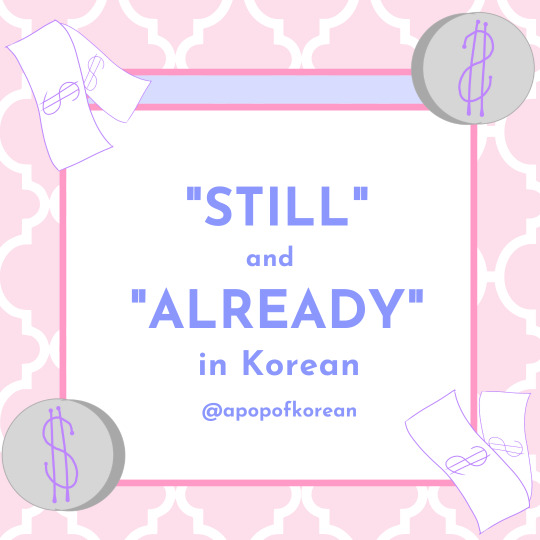
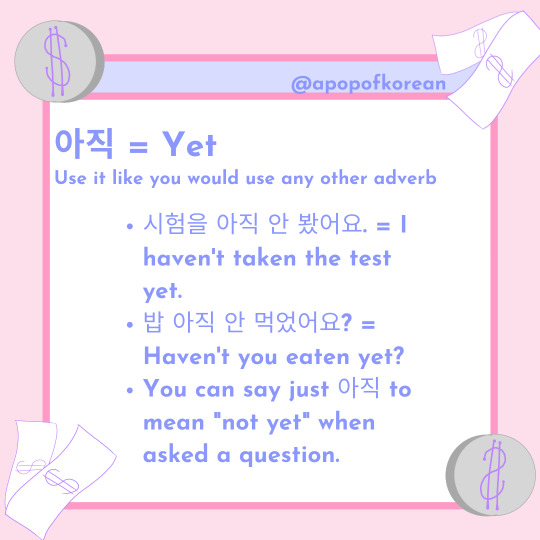
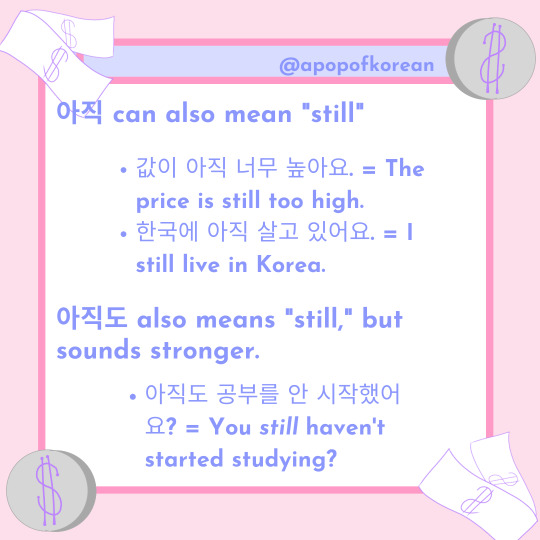
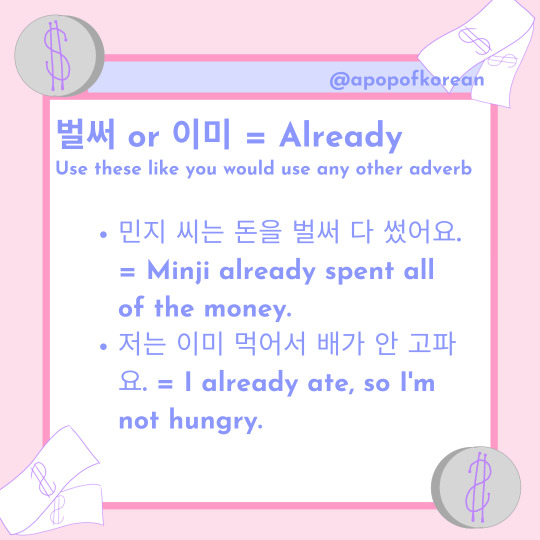
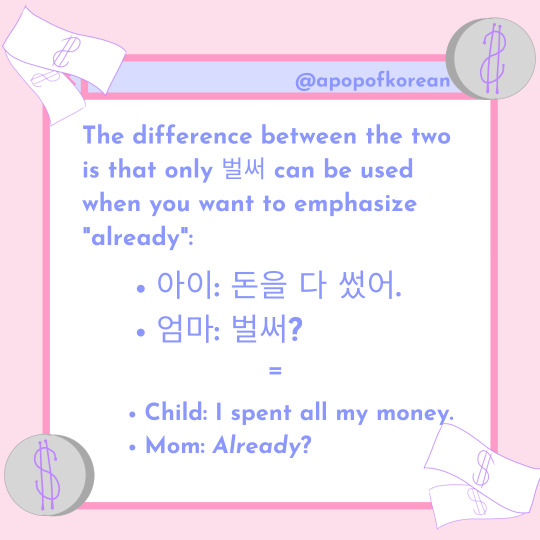
My masterlist
Join my Discord chat here to practice Korean with others!
Follow me on Instagram here!
Get Drops Premium using my affiliate link to expand your Korean vocab!
Check out my Ko-Fi to support this blog and my studies! Thank you for your generosity!
453 notes
·
View notes
Text
MASTERLIST OF KOREAN GRAMMAR/CONCEPTS
ALL BEGINNER SHOULD KNOW

⚠️I got this list from the "koreantopik" website. Not only that but each thing listed there, they have a lesson on it. Visit this website to find and have access to all those lessons😉
If you were on a mission to learn "all" of the beginner grammar in Korean I think this would help you A LOT. For my advice, I'd say break it down into sizeable chunks & take your time to learn each one thoroughly that way you don't have to re-visit it later.
FULL LIST:
1. Expressing Korean Alphabets, Numbers, Dates and Times in Korean
1.1 Korean Alphabet: How to Read, Write, and Pronounce
1.2 Numbers in Korean = Sino-Korean and Native-Korean
1.3 Dates and Times in Korean = reading Year/Month/Date/Day & Hour/Minute
2. Expressing Tenses and Negation in Korean
2.1 Present Tense in Korean = A/V/N-(스)ㅂ니다 or A/V-아/어요.
2.2 Past and Past Perfect Tense in Korean = A/V-았/었어요 and A/V-았/었었어요.
2.3 Future and Progressive Tense in Korean = V-(으)ㄹ 거예요 and V-고 있다
2.4 Negative Expressions in Korean = (1) 아니다, 없다, 모르다; (2) V-지 않다, 안 V; (3) 못 V, V-지 못하다
3. How to Use Particles in Korean
3.1 N-은/는 vs 이/가 = 'topic marker' vs 'subject marker' in Korean
3.2 을/를 and N의 = 'object particle' and 'possessive particle' in Korean
3.3 N와/과, N (이)랑, N하고 = 'and' ~ listing particle in Korean
3.4 N에, N에서 time & place particles in Korean = at/on (time), in/on/at/to (place)
3.5 N에서 N까지, N부터 N까지, N에게/한테(서) grammar = from…to, from..until, to/from N
3.6 N도, N만, N밖에 particles = also/too, only/just, only/nothing but
3.7 N(으)로, N쯤 particles = to/by/using, about/around
3.8 N(이)나, N처럼/ N같이 particles = or/no less than, like/same
3.9 N보다, N마다 particles in Korean = more...than/-er...than, every/all
4. Expressing Listing and Contrast in Korean
4.1 V-고, V-거나, V-지만 grammar = ‘and’, ‘or’, ‘but’ in English
4.2 A-ㄴ/은데, N-인데, V-는데 grammar = (1) 'but', (2) 'so/and' in English
5. Expressing Time Events in Korean
5.1 N 전에/후에, V기 전에, V(으)ㄴ 후에 grammar = before/ago, after/later
5.2 A/V-아/어서 grammar = (1) and/ (in order) to, (2) because (of)/ so that…
5.3 V-(으)면서 grammar = while/during…~actions occurs simultaneously
5.4 V-고 나서 grammar = and then, after doing ~express sequential events
5.5 V-자마자 grammar = as soon as, right after ~something occurs right after the end of an action or event
5.6 V-(으)ㄴ 지 grammar = how long has been 'since' I did something
5.7 N 때, A/V-(으)ㄹ 때 grammar = when, during ~express the time when an action occurs or its duration
5.8 N 중, V-는 중 grammar = in the middle of N/V, currently doing
5.9 N 동안, V-는 동안 grammar = during /for N, while V-ing
6. Expressing Ability in Korean
6.1 V-(으)ㄹ 수 있다/없다 grammar = can/ can't do V ~express possibility to do/ not do something
6.2 V-(으)ㄹ 줄 알다/모르다 grammar = know how to/ don’t know how to V
7. Expressing Demands, Permission, and Prohibition in Korean
7.1 V-(으)세요 grammar = (1) honorific ending ~show respect, (2) making requests politely
7.2 V-지 마세요 grammar = please don’t V~ requesting someone not to do something politely
7.3 V-아/어야 하다 grammar = must, have to ~express necessity to do something
7.4 V-아/어도 되다 grammar = may, can I...? ~ask permission or approval for a behavior
7.5 V-(으)면 안 되다 grammar = may not, not allowed ~express prohibition or limitation of an action
7.6 A/V-지 않아도 되다 (안 A/V-아/어도 되다) grammar = don’t have to ~express the unnecessary of a behavior
8. Expressing Hopes in Korean
8.1 V-고 싶다 = want to, prefer to ~express one's wish or hope
8.2 A/N/V-(으)면 좋겠다 grammar = hope, wish ~express desire, wish, or hope that has not been realized
9. Expressing Reasons and Causes in Korean
9.1 A/V-아/어서 grammar = (1) and/ (in order) to, (2) because (of)/ so that…
9.2 A/V-(으)니까 grammar = (1) because/ since, (2) when/ do sth to discover
9.3 N/A/V-기 때문에 grammar = because (of), since ~Express a reason or cause of a situation
10. Expressing Requests and Assisting in Korean
10.1 V-아/어 주다 and V-아/어 주세요 grammar = assist / please do ~assisting someone or making a request to someone
10.2 V-아/어 줄게요, V-아/어 줄까요? grammar = Shall I, Let me, I will ~attempt to help someone
11. Expressing Experiences in Korean
11.1 V-아/어 보다 grammar = try, have tried ~ tell or ask someone to try or experience something
11.2 V-(으)ㄴ 적이 있다, V-아/어 본 적이 있다 grammar = have done, have tried ~express the past experience
12. Expressing Suggestions and Asking Opinions in Korean
12.1 V-(으)ㄹ까요? grammar = (1) shall we, why don’t we…? (2) shall I, should I…?
12.2 V-ㅂ/읍시다 grammar = let’s, shall we ~suggest someone doing something together
12.3 V-(으)시겠어요? grammar = would you like, why not...? ~politely suggesting or asking for preference
12.4 V-(으)ㄹ래요 grammar = (1) do you want to, how about? (2) be going to, will
13. Expressing Plans and Intentions in Korean
13.1 A/V-겠어요 grammar = (1) will, plan to; (2) looks, sounds
13.2 V-(으)ㄹ게요 grammar = (I) will ~express intention or promise to do something
13.3 V-(으)ㄹ래요 grammar = (1) do you want to, how about? (2) be going to, will
14. Expressing Purpose and Intention in Korean
14.1 V-(으)러 가다/오다 grammar = go/come (to somewhere) to do something
14.2 V-(으)려고 하다 grammar = plan to, intend to ~express intention or plan that has yet to be done
14.3 V-(으)려고 grammar = in order to, so that ~express intention or purpose to do something
14.4 N을/를 위해서, V-기 위해서 grammar = for (the sake of), (in order) to
14.5 V-기로 하다 grammar = decide to, promise to ~make a promise with oneself or someone
15. Expressing Suppositions and Conditions in Korean
15.1 A/V-(으)면 grammar = if, when ~express a supposition or a condition about a fact ...
15.2 V-(으)려면 grammar = if you want/ intend to…then you should…
15.3 N/A/V-아/어도 grammar = even if, regardless of ~a situation occurs regardless of the previous action
16. Expressing Conjecture (or Guess) in Korean
16.1 A/V-겠어요 grammar = (1) will, plan to; (2) looks, sounds
16.2 A/V-(으)ㄹ까요? grammar = (3) do you think, I wonder if ~express a supposition of an action or state
16.3 A/V-(으)ㄹ 거예요 grammar = (2) I think ~express a supposition based on a direct basis
16.4 A-(으)ㄴ 것 같다, V-는 것 같다 grammar = look like, seem, I think ~express a supposition based on subjective reasons
17. Expressing Suffix Changes in Parts of Speech
17.1 A/V-은/는/을 N grammar = N that A/V ~noun modifier
17.2 V-기 grammar = V-ing in English ~turn a verb or a phrase into nouns
17.3 A-게 grammar = '...-ly' or 'in a ... manner' ~turn an adjective into an adverb
17.4 A-아/어하다 grammar =~turn an adjective into a verb
18. Expressing State-of-Being in Korean
18.1 V-고 있다 (2) grammar = ~be wearing/taking off ~state of wearing/taking off something
18.2 V-아/어 있다 grammar = 'V-ed/-ing' ~express the continuing state of a completed action
18.3 A-아/어지다 = to get/become ~express a change over time
18.4 V-게 되다 grammar = became, came to, been decided ~express a change from one state to another
19. Confirming Information in Korean
19.1 -ㄴ/은/는지 + V grammar = V + who/what/where/how/when +clause
19.2 V-는 데 걸리다/들다 grammar = take/ cost (time, money) to do something
19.3 A/V-지요? grammar = isn't / don't /..., right? ~to confirm information
20. Expressing Discovery, Surprise, and so on
20.1 -는군요, -는구나, and -군 grammar = I see that, I didn't realize that ~express surprise
20.2 N(이)네요, A/V-네요 grammar = really, certainly, wow ~ express surprise or agree with someone
20.3 A-(으)ㄴ가요? V-나요? grammar = are/do you...?, Is it...?
20.4 A-(으)ㄴ데요, V-는데요 grammar = (1) well, (2) why/what, (3) wow, (4) set background information
21. Expressing Quotations in Korean
21.1 Direct quotations in Korean 라고 했다, 하고 했다 = said/asked/written
21.2 Indirect quotation in Korean 다고 하다 = said ~citing of what someone said
21.3 Indirect quotation in Korean 냐고 하다 = asked ~citing of what someone asked
21.4 Indirect quotation in Korean 자도 하다 = suggested ~citing of what someone suggested
21.5 Indirect quotation in Korean 라고 하다 = told ~citing of what someone requested
21.6 Indirect Quotations in Korean 대요, 래요, 재요, 냬요 = said, asked, told (casual form)
22. Irregular Conjugations and Common Connective Adverbs in Korean
22.1 Korean ㄷ, ㅂ, ㅅ-irregular verbs and adjectives (Part 1)
22.2 Korean ㅎ, ㅡ, ㄹ, 르-irregular verbs and adjectives (Part 2)
22.3 Common connective Korean adverbs: 그래서, 그러나, 그럼, 그런데, 그래도
655 notes
·
View notes